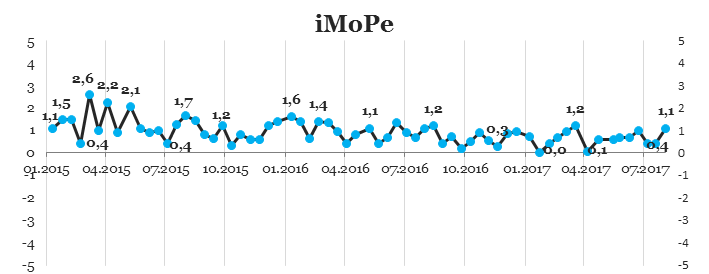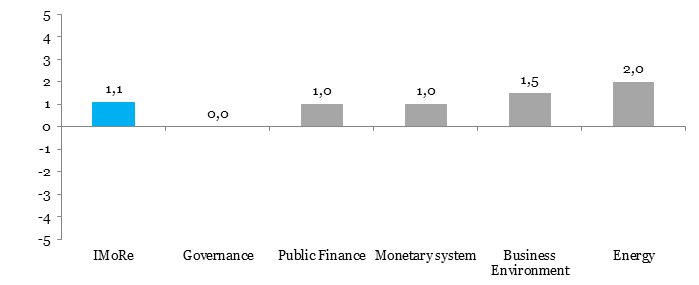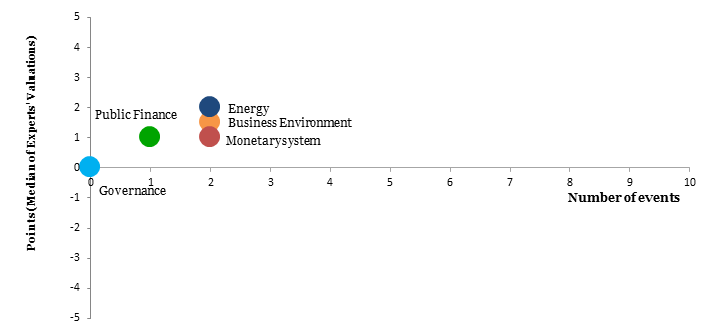Reform Index was equal to +1.1 on the scale of -5.0 to +5.0 during the period of July, 17th – July, 30th 2017 (in the previous round index was equal to +0.4). During this period some progress was observed in the reforms of energy sector, business environment, public finance and monetary system. There were no reforms in the governance sphere.
Main events of this round are laws on commercial accounting of heat energy and water supply and energy efficiency of buildings.
Chart 1. Reform Index dynamics*

* Reform Index team considers index value of at least +2 an acceptable pace of reform
Chart 2. Reform Index and its components in the current round

Top reforms of the issue
- The law on commercial accounting of heat energy and water supply, +4.0 points
Currently only 77% of Ukrainian consumers have water counters, while only 22% of those living in the apartment buildings have them. Households that do not have counters pay for their water consumption according to the approved norms.
The situation with heat supply accounting is even worse – 70% of houses have counters. Those who do not have counters installed have to pay for heating according to the norms which depend on the area of the house. However, installing the counter in the apartment building does not solve the problem of heat accounting in each individual apartment. In such case, practically it is extremely difficult to install individual counters for apartments. Accordingly, even if there is a counter in the apartment building, each individual apartment pays the amount which is proportionate to its area and to the amount of heat consumed by the whole building. Only a small number of apartment buildings which were put into operation in the last years had horizontal heating system, which allows to install individual heat counters in the apartments.
The law 2119-VIII from 22.06.2017 envisages compulsory installation of counters in all buildings which are connected to the external heat networks, networks of hot and cold water supply. Such counters have to be installed by the operators of external networks by October 1st, 2018 for residential buildings and by October, 1st 2017 for nonresidential buildings.
Moreover, for apartment buildings it would be compulsory to install individual devices for accounting and separation of heat energy consumption indicators. Such devices have to be installed by October 1st, 2018 for residential buildings and by October, 1st 2017 for nonresidential buildings.
The law forbids connecting new buildings that do not have counters mentioned above to the networks.
- The law on energy efficiency of buildings, +3.8 points
The law 2118-VIII from 22.06.2017 introduces certificates of energy efficiency of buildings. Each building has to obtain such certificate, which indicates its energy efficiency class. It would also give recommendations on how to increase energy efficiency class and provides other details about the building.
Energy efficiency class of the buildings which are put into operation have to be higher or equal to minimum energy efficiency requirements which are in place at the time of the start of construction works. Minimum energy efficiency requirements would be reviewed every 5 years.
Certificate would be granted after energy audit. The law introduces the profession of energy auditors and the principals of professional certification of such specialists.
Chart 3. Value of Reform Index components and number of events

Reform Index aims to provide a comprehensive assessment of reform efforts by Ukraine’s authorities. The Index is based on expert assessments of changes in the regulatory environment in five areas:
- Governance
- Public Finance
- Monetary system
- Business Environment
- Energy
For details please visit reforms.voxukraine.org
Attention
The author doesn`t work for, consult to, own shares in or receive funding from any company or organization that would benefit from this article, and have no relevant affiliations



